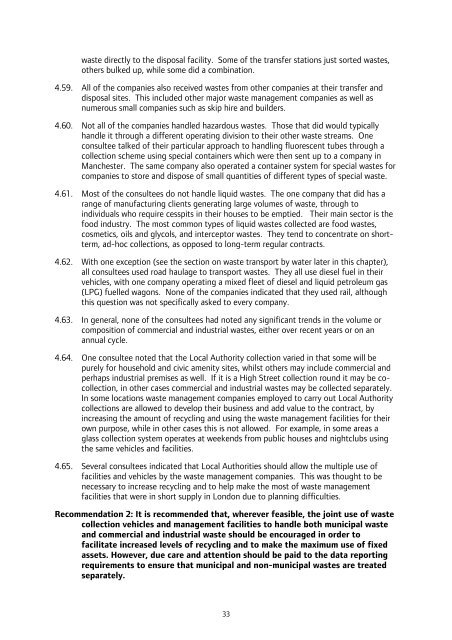London Wider Waste Strategy - London - Greater London Authority
London Wider Waste Strategy - London - Greater London Authority
London Wider Waste Strategy - London - Greater London Authority
You also want an ePaper? Increase the reach of your titles
YUMPU automatically turns print PDFs into web optimized ePapers that Google loves.
waste directly to the disposal facility. Some of the transfer stations just sorted wastes,<br />
others bulked up, while some did a combination.<br />
4.59. All of the companies also received wastes from other companies at their transfer and<br />
disposal sites. This included other major waste management companies as well as<br />
numerous small companies such as skip hire and builders.<br />
4.60. Not all of the companies handled hazardous wastes. Those that did would typically<br />
handle it through a different operating division to their other waste streams. One<br />
consultee talked of their particular approach to handling fluorescent tubes through a<br />
collection scheme using special containers which were then sent up to a company in<br />
Manchester. The same company also operated a container system for special wastes for<br />
companies to store and dispose of small quantities of different types of special waste.<br />
4.61. Most of the consultees do not handle liquid wastes. The one company that did has a<br />
range of manufacturing clients generating large volumes of waste, through to<br />
individuals who require cesspits in their houses to be emptied. Their main sector is the<br />
food industry. The most common types of liquid wastes collected are food wastes,<br />
cosmetics, oils and glycols, and interceptor wastes. They tend to concentrate on shortterm,<br />
ad-hoc collections, as opposed to long-term regular contracts.<br />
4.62. With one exception (see the section on waste transport by water later in this chapter),<br />
all consultees used road haulage to transport wastes. They all use diesel fuel in their<br />
vehicles, with one company operating a mixed fleet of diesel and liquid petroleum gas<br />
(LPG) fuelled wagons. None of the companies indicated that they used rail, although<br />
this question was not specifically asked to every company.<br />
4.63. In general, none of the consultees had noted any significant trends in the volume or<br />
composition of commercial and industrial wastes, either over recent years or on an<br />
annual cycle.<br />
4.64. One consultee noted that the Local <strong>Authority</strong> collection varied in that some will be<br />
purely for household and civic amenity sites, whilst others may include commercial and<br />
perhaps industrial premises as well. If it is a High Street collection round it may be cocollection,<br />
in other cases commercial and industrial wastes may be collected separately.<br />
In some locations waste management companies employed to carry out Local <strong>Authority</strong><br />
collections are allowed to develop their business and add value to the contract, by<br />
increasing the amount of recycling and using the waste management facilities for their<br />
own purpose, while in other cases this is not allowed. For example, in some areas a<br />
glass collection system operates at weekends from public houses and nightclubs using<br />
the same vehicles and facilities.<br />
4.65. Several consultees indicated that Local Authorities should allow the multiple use of<br />
facilities and vehicles by the waste management companies. This was thought to be<br />
necessary to increase recycling and to help make the most of waste management<br />
facilities that were in short supply in <strong>London</strong> due to planning difficulties.<br />
Recommendation 2: It is recommended that, wherever feasible, the joint use of waste<br />
collection vehicles and management facilities to handle both municipal waste<br />
and commercial and industrial waste should be encouraged in order to<br />
facilitate increased levels of recycling and to make the maximum use of fixed<br />
assets. However, due care and attention should be paid to the data reporting<br />
requirements to ensure that municipal and non-municipal wastes are treated<br />
separately.<br />
33
















